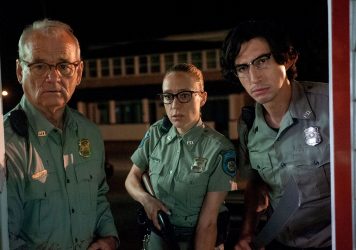
In a secluded Brazilian village, tradition and modernity collide with bizarre, hyperviolent results.
Something’s amiss in the tucked-away corner of Brazil that lends the latest film from Kleber Mendonça Filho and Juliano Dornelles (Mendonça’s longtime production designer, now promoted to co-director) its title and setting. The road into the dusty town centre is littered with wooden coffins that water delivery trucks plow through with no mind paid.
One day, out of nowhere, Bacurau vanishes from online maps. The collection of eccentrics and inscrutables making up the populace pop a psychotropic pill before momentous occasions – funerals, all-out assault against a band of marauding tourists intent on leaving the area strewn with carnage in their imperialist wake, that sort of thing.
What begins as a fictitious salvage ethnography, as the camera documents the ins and outs of life in a unique cultural space threatened by encroaching globalisation, tromps into the untamed wilds of genre territory as what could charitably be labeled a “plot” gets a-kickin’.
While the tendrils of the outside world have begun to creep into the Bacurau enclave, bringing politicians and the bribes they think will win over this proud people, the locals have maintained some semblance of privacy and self-sufficiency. The change to their status quo goes from incremental to extreme with the arrival of a homicidal safari party in the region, led by Udo Kier in a role suffused with his inimitable Udo Kier-ness (i.e. preening, unwavering menace).

Mendonça and Dornelles draw their battles lines early, in luminescent paint the colour of freshly spilled blood. Bacurau represents an Eden in its final prelapsarian days, slightly less idyllic while no less sacred. Kier and his players of the most dangerous game, clad in heinous wraparound shades that just scream “Western exceptionalism”, embody the toxic influence of colonial states wherever isolationist communities wish to be left alone.
The script lays their half of the action on a bit thick, though the baldly stated jingoisms may be a side effect of two native Portuguese speakers writing in English. At any rate, they’d rather let their extensive collection of antique firearms do the talking for them. The particulars of this conflict make the film a far more bizarre and bewitching viewing experience than it might sound on paper. That bit about the guns all being vintage as a rule, for instance, goes unexplained.
Mendonça and Dornelles like to wait before clarifying certain images with context, making such elements as the sudden appearance of what appears to be a UFO even more strange and otherworldly. Until the bullet-strewn grand finale, the directors keep us in a suspended state of baffled wonder. Jabs of gallows humour further confound, disrupting what could otherwise be a militantly grim tone with japes we’re not sure we’re allowed to laugh at.
It all amounts to one sublimely unusual beast, a radical departure for Mendonça while at the same time tethered to his ongoing interest in orneriness and its limited utility. His last picture elevated the stubborn streak of a woman (Sonia Braga, back again in Bacurau as the resident doctor) refusing to vacate her apartment building to heroic heights, and afforded her only a purely pyrrhic victory.
By expanding the square footage of this bitter face-off, ratcheting the stakes up to mass murder from real estate negotiation, and embracing gonzo shootouts in the grandly grisly tradition of Peckinpah, he’s achieved a new cinematic high. That last word isn’t used idly, either, not for the crowds here at Cannes; running on three hours of sleep in a country far from home, the unexpected fusion of semi-automatic action with politicised fury feels like its own drug.
Published 16 May 2019

By Ian Barr
Brazilian writer/director Kleber Mendonça Filho returns with a highly original and unusual film about nostalgia.

Jim Jarmusch takes aim at the ills of capitalism in this star-studded smalltown zombie comedy.

There’s distinctive new voice booming from Brazil (and it sounds a lot like John Carpenter).